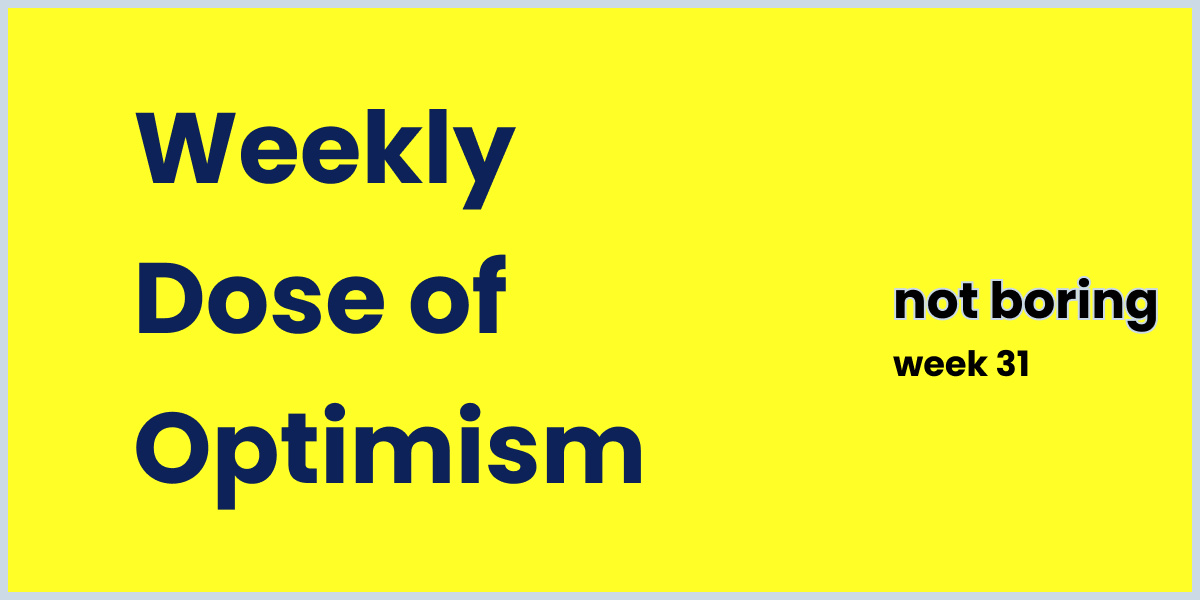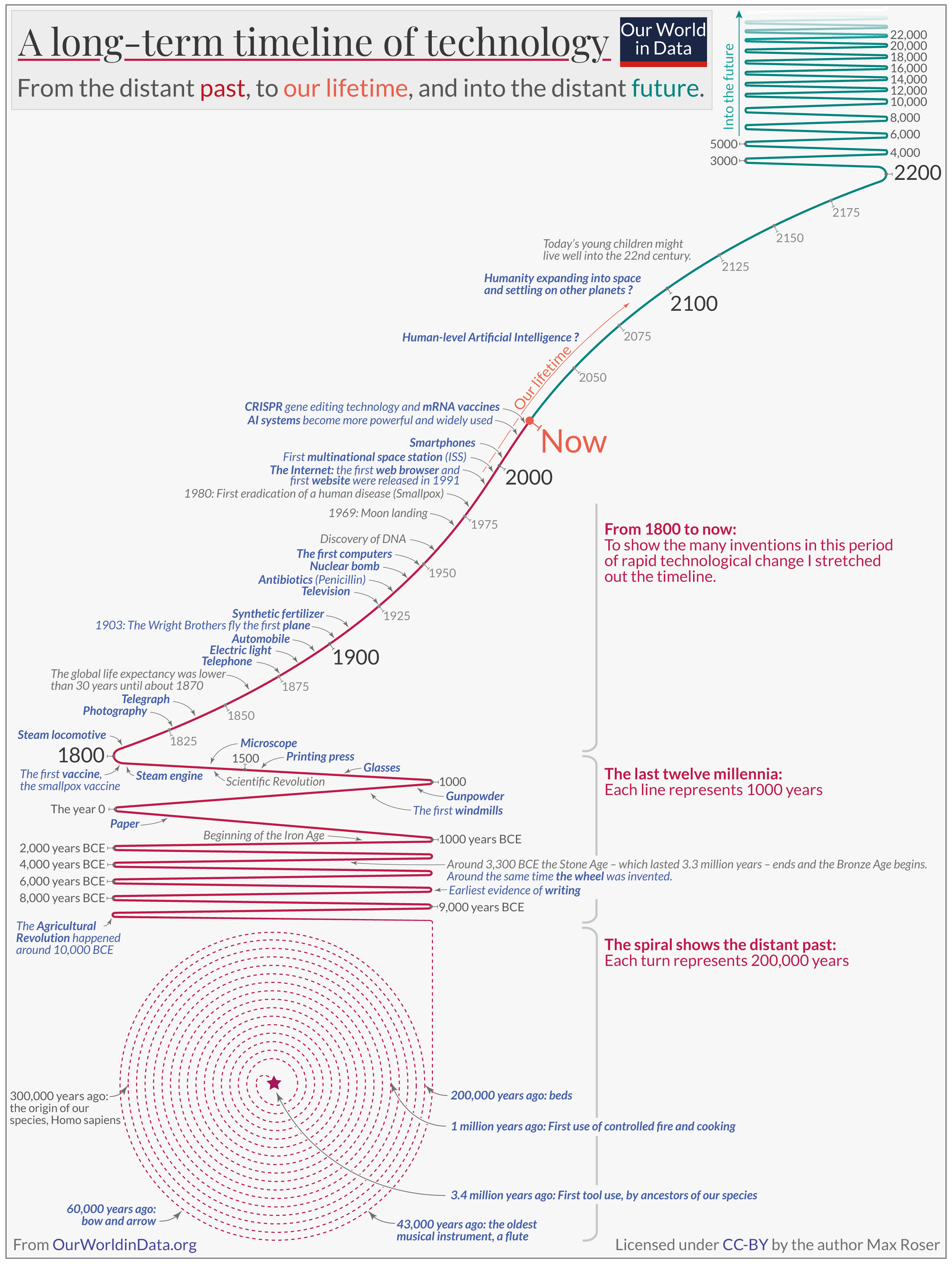Not Boring by Packy McCormick - Weekly Dose of Optimism #31
Weekly Dose of Optimism #314 Day Work Week, Freak Trees, Quantum Computing, Technological Progress, Necessary Immigration, and Anti-Doomerism.Hi friends 👋, Happy Friday and welcome back to our 30th Weekly Dose of Optimism. Relatively quiet week on our end, but a bunch of good stuff happening around the universe that we’re excited to share. Let’s get to it. Today’s Not Boring is brought to you by… Wander Wander has gotten more clicks than any sponsor in the history of Not Boring…and there’s good reason: the vacation homes are exquisite. Puja and I are currently planning our next trip at a Wander…maybe at Surfside Beach, looks lovely. Plus, its Atlas vacation rental REIT presents a unique investment opportunity. Wander is a network of smart vacation homes that come with inspiring views, modern workstations, restful beds, hotel-grade cleaning and 24/7 concierge service –– combining the quality of a luxury hotel with the space and comfort of a vacation home, only better. Wander is sweetening their offer for Not Boring readers: you can use promo code notboring500 (case sensitive) for $500 off your next trip. (Offer expires Friday 3/3 at 11:59pm ET). Explore now. But that’s only part of the story. Wander recently launched Atlas –– a first-of-its-kind vacation rental REIT that gives you the chance to own a piece of their magical portfolio of homes. With Atlas, accredited investors have the opportunity to earn income and diversify their portfolio without the headache and hassle of buying a property, renting it out, or maintaining it. Plus, new Atlas investors may get the chance to invest in Wander’s next round of funding. ¹ (1) Trial Run of 4-Day Workweek Wins Converts Lora Kelley for The New York Times
Progress is great. There’s this pervasive fear that productivity gains will take everyone’s jobs, but as we wrote about in our piece on Formic, what actually happens is that people find new, more interesting jobs. A much lower percentage of us work on farms to feed our families than we used to; now some people get to do silly things like write newsletters for work. But something else happens, too. Instead of some people losing all of their work, most people get to work less. Kids don’t go to work on the family farm at ten years old; they go to school. Fewer people work until the day they die; many retire at 65. The two-day weekend, something we take for granted, didn’t become widespread until the 1930s. Today, remote or hybrid work means less time commuting and more time at home. Some companies are even experimenting with a 4-Day Work Week, and the results of this study out of Britain are promising: less work, no productivity loss. We McCormick boys are no future of work experts. Our situation is unique: Packy and I both work from home, do some amount of “work” 7 days a week, maybe talk about work-related topics live once per quarter, send a few Slack messages a day, manage a small super-liquid team, and haven’t changed out of sweatpants in three years. Some people are working on all-consuming, ambitious missions that require seven days a week, in-person, and we’re all for that too. But if people in a lot of jobs can get just as much shit done in four days as they do in five days, then why not give them back an extra day to pursue their non-work lives? If all we get from this technological progress is 14% more time to do the things we love doing vs. working, that’s still pretty powerful. Which is why we were pumped to see the positive results of the largest 4 Day Work Week Trial ever:
The real question is: we taking off Mondays or Fridays? (2) Genetically Modified Trees Are Taking Root to Capture Carbon Margaret Osborne for Smithsonian Magazine
There are two ways to reduce our carbon footprint:
We’ve written extensively about projects that are focusing on the latter. Carbon removal is the focus of Frontier, the advance market commitment, lead by Stripe and other major tech companies, to buy an initial $925M of permanent carbon removal. Living Carbon, a SF-based startup that, as far as we can tell, is not associated with Frontier but is partnered with Stripe, recently became the first organization to plant genetically modified trees in the U.S. outside of trial or commercial forests. The trees are designed to grow up to 53% larger, suck up 27% more carbon, and store the carbon in a more permanent way than natural trees. The startup plans on planting 4-5 million of these freak-trees in the next year and hope to capture 600 megatons by 2030. They won’t solve climate change, but they’ll make a dent on removing carbon we’ve already emitted. (3) Google’s quantum computer hits key milestone by reducing errors Davide Castelvecchi for Nature
We will not attempt to explain this quantum computing milestone from a technical perspective — that’s way above our paygrade. But the breakthrough, most easily summarized as error reduction in quantum computing, is noteworthy because it’s the second of six milestones achieved by Google on its roadmap to producing a “useful quantum computer.” We don’t know exactly when quantum computing will be “useful” but it’s worth noting that the progress does seem to be lining up with breakthroughs in AI. Quantum computers, in the simplest terms, allow for really big complex math problems to be performed more quickly. That may be an understatement: quantum computers are 158 million times faster than the most sophisticated supercomputers in action today. So imagine an AI that is run on a computer 158 million times more efficient than whatever OpenAI is using today…and then imagine what the world will look like with that type of AI running around. Eliezer weeps. The big question is: when quantum computing is commercially viable, will Google have what it takes to commercialize it, or will they really be the modern Xerox PARC? Max Roser for Our World in Data Speaking of imagining how technological progress will shape the future (and the past), Our World in Data released a new report on technological progress throughout the course of history. The main takeaway for me is that the slope of technological progress exploded upwards starting in the 1800s. We went a million years between controlled fire and the invention of the steam locomotive. And 145 years between the invention of the steam locomotive and the first nuclear bomb. Compounding is a hell of a drug, and save any catastrophic misstep, I anticipate that society will continue to compound its way on the long upward slope of progress for the foreseeable future. The type of progress that humans living today have experienced is more linear than exponential…but the introduction of something like a quantum-powered AI might just shoot that slope vertical. The not-so-distant future (100 years from now) will likely be less recognizable to humans today than the distant past. (5) Two Essays from Noah Smith Noah Smith for Noahpinion We’ve said this before and we’ll say it again: if Noah Smith keeps putting out bangers, we’re going to keep covering them. He published five worthwhile pieces in the last week alone, but we’ll focus on two:
Once Smith properly addressed Lorenz’ claims, he delves into a full explanation as to why this type of doomerism is net bad for the world: it doesn’t allow for focus on the most important problems (ie Long Covid vs. Climate Change) and de-motivates people from trying to solve those problems. We’re obviously in the optimistic camp here. We’re not blind to the troubles of the world, but we subscribe to David Deutsch’s Principle of Optimism states that “All evils are caused by insufficient knowledge.” In order to cure those evils, we need to get back to a society that prioritizes truth and doesn’t get caught up in doomerism. Did you enjoy reading this Weekly Dose of Optimism? (Powered by Sprig) That’s all for this week. We’ll be back in your inbox on Monday. Thanks for reading, Dan 1 You can learn more on Wander Atlas’ website. Not Boring by Packy McCormick is free today. But if you enjoyed this post, you can tell Not Boring by Packy McCormick that their writing is valuable by pledging a future subscription. You won't be charged unless they enable payments. |
Older messages
Love in the Time of Replika
Tuesday, February 21, 2023
Why crypto and AI are perfect bedfellows, actually
Weekly Dose of Optimism #30
Friday, February 17, 2023
What's Our Problem, T1D, Alzheimer's Detection, Binge Drinking, Beautiful Information
Tell Good Stories
Tuesday, February 14, 2023
Rahul on Sci-Fi, Spectacles, and Making the Frontier Not Boring
Weekly Dose of Optimism #29
Friday, February 10, 2023
Stable Attribution, Indian Industrialization, Trikafta, Florida Man, Solar Capacity, Go Birds
Startup Prophecies
Tuesday, February 7, 2023
Building Rich Worlds Around Bold Startups, a Riff on Prophecy Markets
You Might Also Like
🔮 $320B investments by Meta, Amazon, & Google!
Friday, February 14, 2025
🧠 AI is exploding already!
✍🏼 Why founders are using Playbookz
Friday, February 14, 2025
Busy founders are using Playbookz build ultra profitable personal brands
Is AI going to help or hurt your SEO?
Friday, February 14, 2025
Everyone is talking about how AI is changing SEO, but what you should be asking is how you can change your SEO game with AI. Join me and my team on Tuesday, February 18, for a live webinar where we
Our marketing playbook revealed
Friday, February 14, 2025
Today's Guide to the Marketing Jungle from Social Media Examiner... Presented by social-media-marketing-world-logo It's National Cribbage Day, Reader... Don't get skunked! In today's
Connect one-on-one with programmatic marketing leaders
Friday, February 14, 2025
Enhanced networking at Digiday events
Outsmart Your SaaS Competitors with These SEO Strategies 🚀
Friday, February 14, 2025
SEO Tip #76
Temu and Shein's Dominance Is Over [Roundup]
Friday, February 14, 2025
Hey Reader, Is the removal of the de minimis threshold a win for e-commerce sellers? With Chinese marketplaces like Shein and Temu taking advantage of this threshold, does the removal mean consumers
"Agencies are dying."
Friday, February 14, 2025
What this means for your agency and how to navigate the shift ͏ ͏ ͏ ͏ ͏ ͏ ͏ ͏ ͏ ͏ ͏ ͏ ͏ ͏ ͏ ͏ ͏ ͏ ͏ ͏ ͏ ͏ ͏ ͏ ͏ ͏ ͏ ͏ ͏ ͏ ͏ ͏ ͏ ͏ ͏ ͏ ͏ ͏ ͏ ͏ ͏ ͏ ͏ ͏ ͏ ͏
Is GEO replacing SEO?
Friday, February 14, 2025
Generative Engine Optimization (GEO) is here, and Search Engine Optimization (SEO) is under threat. But what is GEO? What does it involve? And what is in store for businesses that rely on SEO to drive
🌁#87: Why DeepResearch Should Be Your New Hire
Friday, February 14, 2025
– this new agent from OpenAI is mind blowing and – I can't believe I say that – worth $200/month





